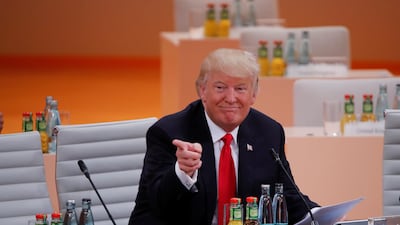Donald Trump’s Warsaw speech last week outlined the theoretical framework of his emerging foreign policy. It also reinforced the impression that he frequently assumes Washington operates from a position of largely imaginary vulnerability and weakness.
Consequently, Mr Trump’s America is unnecessarily surrendering global leadership and competitive advantages, and voluntarily embracing premature decline.
In his inaugural address, Mr Trump painted a surreal, virtually post-apocalyptic landscape of “American carnage”, describing devastating disasters of decay, dissipation, poverty and crime.
Some parts of the country are struggling and many residents of benighted areas voted for Mr Trump. But, at the broad national level, this account of desperate American deterioration is almost entirely imaginary.
True, the United States is in a protracted period of relative decline, but from two unsustainable positions of global dominance that were indisputably historical anomalies.
First, following the Second World War, the American economy enjoyed historically unprecedented international competitive advantages. As the industrialised world eventually recovered and the postcolonial world slowly developed, this unique global economic dominance proved unsustainable. Second, after the fall of the Soviet Union, the United States emerged as the sole remaining superpower. While American strength remains unmatched in military and technological terms, almost worldwide military primacy was another historical contingency, and will prove no more sustainable than unrivaled global economic domination.
Nonetheless, it’s absurd to conclude that, because other countries are now developing their own international military and economic clout, the United States is therefore a weak or besieged country.
On the contrary, American annual growth still outstrips that of most other developed economies. Washington’s military power remains unrivaled, and is still capable of prevailing in virtually any imaginable conflict. In higher education, technology, economic and other key indicators, the United States, albeit in relative decline from these unparalleled heights, is still the only great global power.
You’d never believe that listening to Mr Trump. His Warsaw speech was essentially the internationalisation of his dystopian inaugural address, but instead of “American carnage”, he described a generalised West, supposedly under siege, that must urgently unite to defend its civilisation from shadowy, largely unspecified, threats.
Jingoistic accounts of the defence of Polish nationalism were proffered as a synecdoche for safeguarding a supposedly besieged “western civilization” (in which, historically, westerners have rarely included Poland). Sub-Reaganite phrases, meant to inspire, were weird and downright Quixotic.
The existential threats Mr Trump targeted included, in descending order of mortal peril, Islamist terrorists, Russia and even the West’s own civil servants.
TS Eliot argued Hamlet fails as a play because it provides no “objective correlative”, wherein events in the drama justify the emotions being expressed by the characters and evoked in the audience. Mr Trump’s imagining of a weak, bankrupt America in freefall is a much better example.
This nightmarish fantasy has informed a range of policy missteps, including abandoning the Trans-Pacific Partnership, apparently because impoverished Americans can’t afford long-term trade planning and must rummage through global scrapheaps to grasp at any immediate and ephemeral “wins”.
Consequently, Europe and Japan are forming their own giant economic bloc without American participation, while China is developing another under its influence in Asia.
The same presumed weakness explains leaving the Paris climate accord and inviting Russia to determine the future of Bashar Al Assad in Syria. The crisis over Qatar is cast as a “family issue,” thus far to be resolved without significant American input either way.
Retired diplomat James Dobbins recently argued this is primarily just a familiar politically and historically frequent cyclical iteration of American “retrenchment”, seeking a respite from the rigours of global leadership before a reluctant re-embrace of Washington’s international role.
Walter Russell Mead, the preeminent living scholar of American foreign policy traditions, sees Mr Trump’s outlook as essentially “Jacksonian” blood-and-soil nationalism that was a major feature of American debates until the Second World War and is now making a major comeback.
Both arguments are extremely compelling, but neither fully explains the persistent subtext of American and now western decline and weakness.
Clearly a third element is at work. Beyond neo-isolationist retrenchment and nativist Jacksonian nationalism, Mr Trump typically speaks and acts as if he were the leader of a poor and weak power rather than a strong and wealthy one.
Unfortunately, a barely-disguised subtext to Mr Trump’s rhetoric sometimes flirts with “clash of civilisations” Western chauvinism, anti-immigrant xenophobia and even white supremacy. Passages in his Warsaw speech invoking the alleged historic uniqueness and superiority of western civilisation were unmistakable.
Whether Mr Trump is deliberately pandering to cultural chauvinism and racial supremacy or cynically invoking nonexistent crises to pose as a saviour is anyone’s guess.
Less mysterious is the deep damage to American interests, and profligate squandering of real advantages, that is rapidly accumulating through this radical underestimation of what are, in reality, Washington’s still unrivaled global military, economic and technological prowess.
Hussein Ibish is a senior resident scholar at the Arab Gulf States Institute in Washington


